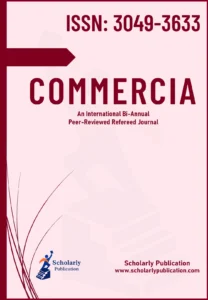
Commercia – Journal of Commerce and Management
An International Bi-Annual Peer-Reviewed Refereed Journal
About Commercia
Commercia is an open-access international bi-annual peer-reviewed refereed journal dedicated to advancing knowledge in commerce and management. As a platform for cutting-edge research and insightful reviews, and impactful case studies, Commercia aims to bridge academic research and industry practice, providing a resource for both …
Why Choose Commercia
- Quality and Integrity: High editorial standards through rigorous double blind peer review.
- Interdisciplinary: Publishes diverse and innovative research across commerce and management.
- Global Reach: Open-access for broad visibility of your research in academia and industry worldwide.
- Timely Publication: Efficient review process for quickly share the findings with the community.
- Author Support: Comprehensive guidance from submission to publication.
- Rigorous Peer Review: Commitment to maintaining high academic standards through expert evaluation.
Commercia is more than a publication; it is a community committed to advancing thought leadership and actionable knowledge in commerce and management. We welcome contributions from scholars and professionals worldwide.
Submit your article to Commercia
For Indian Authors: ₹ 3000
For others: US$ 100
Article Processing Charge
03 Days
Median time from submission to first editorial decision before peer review
15 Days
Median time from submission to first decision after peer review
25 Days
Median time from submission to final acceptance after peer review and any author revisions
Editor-in-Chief View Full Editorial Board
Editor-in-Chief

Dr. Shubhendra Gupta
Ninepages Techsolutions Private Limited, Agra, Uttar Pradesh, India
